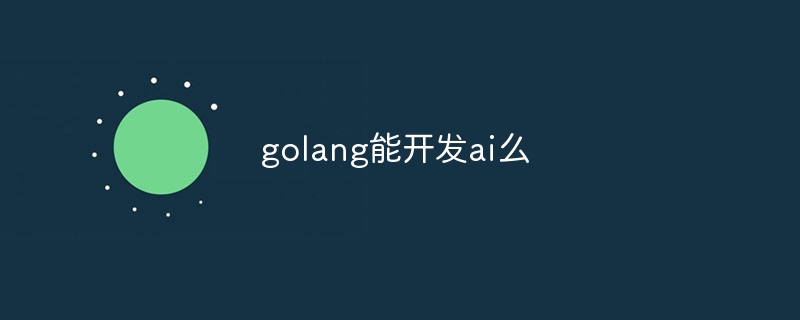Home >Common Problem >Can golang develop ai?
Can golang develop ai?
- 百草Original
- 2023-07-17 15:31:322145browse
Golang can develop AI because: 1. Golang has excellent concurrency performance and lightweight threading model, which gives it a strong advantage in processing large-scale data sets and complex algorithms; 2. Golang has a wealth of libraries and tools that can support data preprocessing, model training and inference in AI development.

The operating environment of this article: Windows 10 system, go1.20 version, DELL G3 computer.
Golang (Go language) is an open source programming language developed by Google and has gradually become widely used in the field of software development. It is designed to provide a fast, simple and reliable solution with a high degree of concurrency performance. Although Golang is excellent at developing web applications and network services, is it suitable for developing artificial intelligence (AI)? This article will explore the advantages and limitations of Golang in AI development.
First of all, Golang has excellent concurrency performance and lightweight threading model, which gives it a strong advantage in processing large-scale data sets and complex algorithms. Concurrency processing is particularly important for AI applications, because AI algorithms generally need to be trained and inferred on a large amount of data. Through the goroutine and channel mechanisms, Golang can speed up the execution of AI applications through parallel processing, and can effectively manage resources and coordinate communication between different modules.
Secondly, Golang has a wealth of libraries and tools that can support data preprocessing, model training and inference in AI development. For example, Golang's standard library provides parsing and processing support for common data formats such as JSON, CSV, and XML, making it easier to process and transform data. In addition, Golang also provides some open source libraries such as Gorgonia, go-fn, etc., which can efficiently train and infer neural networks, deep learning models, etc.
However, compared with other programming languages, Golang also has some limitations in the field of AI. First of all, although Golang has a wealth of libraries and tools, compared with other languages such as Python, Golang's AI libraries and tools are relatively few and not mature enough. This means that it may take more time to implement some basic functions and algorithms yourself in AI development. Secondly, although Golang is fast, simple and reliable, in terms of certain AI algorithms that require a lot of mathematical calculations, Golang's performance may be slightly inferior compared to using more optimized languages such as C or Python.
Despite some limitations, Golang can still be a reasonable choice for AI development. Especially for developers who already have Golang development experience, using Golang to develop AI applications allows them to start AI projects without learning a new language, and can make full use of Golang's advantages in concurrency processing and performance optimization. In addition, Golang's concise and standardized language design can make the code easier to read, maintain and expand.
In summary, although Golang has some limitations compared to other languages such as Python in the field of AI development, it is still a feasible choice. Golang's concurrency performance, lightweight threading model, and rich library and tool support can help developers achieve good performance when processing large-scale data and complex algorithms. For developers who already have Golang development experience, using Golang to develop AI applications can improve development efficiency and reduce the learning curve. Therefore, although it may not be the best choice, Golang still has its unique advantages in AI development.
The above is the detailed content of Can golang develop ai?. For more information, please follow other related articles on the PHP Chinese website!

